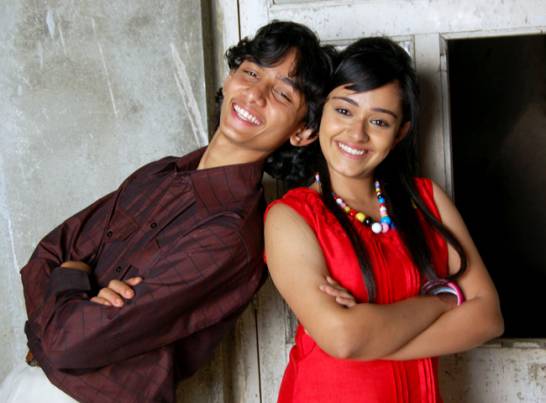Bubble Gum is in colour but in my head it is playing in sepia yellow and faded with age, yet full of feelings, mood and nostalgia. Bubble Gum’s poster is seriously misleading. The blue ankle-high canvas shoes suck on pink chewing gum convey that this is a film about the tough life of a newbie teenager today. That’s not the case at all. This is a film for all those in the 35 to 50 age group. It’s an emotional trip to their adolescence. For them, the teenagers of Sixties, Seventies and Eighties, Bubble Gum does a delicious thing. While watching this film, another one starts to play in your head about your life, when you were 14, 15, 16. A film about your friends, family and first love.

You’ll find yourself back home with the Godrej almirah and mummy’s stiff cotton sarees, the dressing table and the cane furniture. You’ll yearn for the glass water bottles in the fridge, those steel thalis and the seeti of the pressure cooker. You’ll recall the cool breeze from the fan when you’d return from school and collapse on the bed, and find yourself smiling at the thought of the only aunty in the colony with a telephone in her drawing room. You’ll wonder how you managed to have cold drinks, samosas and, of course, bubble gum, with your pitiful pocket money. Check, it’s probably still there, under the dining table. Stiff and dry as a bone, but still stuck.
Then your mind will drift to those hand-written love letters and how you’d hide them in panic. Those were the days when pulses raced on spotting a Debonair dangling from a clip at a book stall; days when one rose said it all and stayed with us, hidden and drying in a book. Those were the days when all colony love stories had colony villains. When neighbours tattled, and father shouted, “Baal katwa do, sab hero-giri band ho jayegi”. Those were days when love meant life and rejection was death.
There was also, always, in those days, one Christian family in the colony with the most alluring and elusive daughter. In our colony it was Michelle. In Bubble Gum it is Jenny (Apoorva Arora). We find ourselves again in Jamshedpur, the same city we last visited in Udaan. That world, created by Vikramaditya Motwane, was real, lonely and disturbing. This one is also real, but it’s glowing and warm. In a colony of flats built around a kachcha playground lives a middle-class family. There’s father (Sachin Kheddekar) who works in a steel factory, schoolteacher mother (Tanvi Azmi) and their two sons. The younger son, Vedant (Delzad Hiravali), is 14 and goes to school.
It’s the last day of school before Holi holidays and Vedant has cycled real fast, red rose in mouth, to catch a glimpse of the girl he loves, Jenny. But that lout from his colony, Ratan (Suraj Singh), is in Jenny’s house. Vedant’s life now seems pointless. But the mood back home is bright. A telegram has announced the arrival of elder brother Vidur (Sohail Lakhani) who lives in a hostel and studies at the school for deaf and dumb. Vidur arrives and a lovely song sets the mood — everyone is happy, the family is complete and bonding. There are picnics, special meals, chit-chat, but Vedant is distracted by thoughts of losing Jenny.
His Rakhi-sister helps the two meet, but Ratan is always, somehow, around. And then, father-mother tell Vedant to take Vidur out with him as well. Vidur adores Vedant, but Vedant’s feelings are mixed. He resents that Vidur is always the better one, the brighter one, and that he, the younger brother, has to babysit. Vedant tries to include his brother in his gang, but his friends make fun of Vidur. A cumbersome hearing aid arrives, but the joy doesn’t last long. There are tears and tantrums. Parents shout, Vedant sulks, mistakes are made and hurtful things are said.
And then there is Ratan, smiling and inching towards Jenny. Ratan and Vedant fight and agree to a challenge, and so it begins, the countdown to Holi, and to get Jenny. Holi’s significance in those days, I think, needs to be explained. Holi then meant going in tolis to where the girls were and making the first real contact, with the girl and her parents. While bending down to touch parents’ feet, images of prospective in-laws popped inside happy heads. Anyway, games are played, arguments are settled by fisticuffs, chanda is collected and preparations for Holi are under way. Passionate feelings are conveyed with subtle smiles, but life takes its own whimsical turns. And then it goes on, again, crammed with friends, parents, love, disappointments and joy of living.
Sanjivan Lal, who has written and directed Bubble Gum, tenderly and meticulously creates the world we once inhabited, even ruled. This is a world where all boys had naan chaks and all girls dreamt of church weddings. Here, all teenagers collected stamps and Indrajal Comics, and decorated their rooms with posters from Sun magazine. Everyone chewed on Phantom cigarettes, cycled and drank ganne ka juice. In this world “joint studies” was an alibi and brothers always stood by you. Here fights ended with tears and hugs, and evening nashta meant veg-patties and pineapple pastries. I am of that vintage, and I smiled and wept throughout.
Bubble Gum’s story is small, simple but lovely. It plays out on the screen without a single false note. The film’s pace is calm and the director is very clear about what he wants to say and how. Bubble Gum has a very high emotional quotient and is full of touching moments, especially when parents discuss their parenting skills and failures. The film’s songs are very nice and all performances are striking, especially those of Tanvi Azmi and the boys playing her two sons Sohail Lakhani and Delzad Hiravali.
